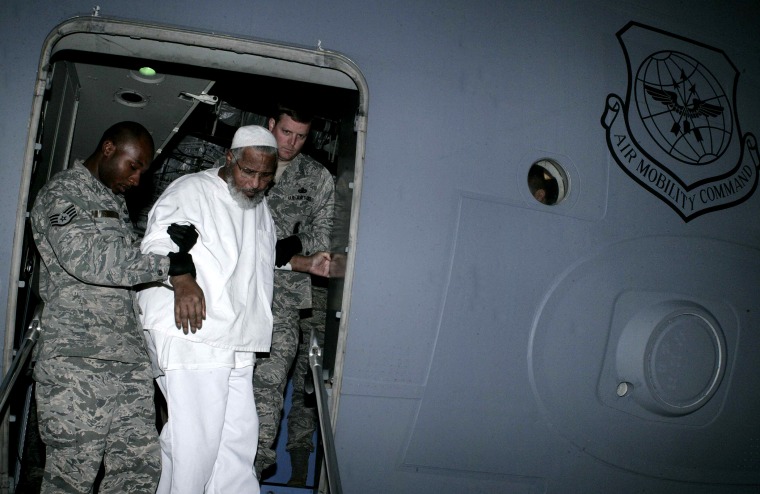The Department of Defense announced Wednesday that it had transferred two Sudanese prisoners at Guantanamo to the custody of their home country, reducing the population at the prison to 158.
The repatriation of Noor Uthman Muhammed and Ibrahim Othman Ibrahim Idris -- who were accused by the U.S. of being terrorists -- follows the move earlier this week to send two other prisoners back to Saudi Arabia.
Six detainees have been transferred out of U.S. custody this month alone, and eight have been sent home since August. President Obama recommitted to closing the infamous detention center in a national security speech in May. More than half of the remaining prisoners have been cleared for release or transfer by an administration-appointed task force.
Most of the men held at Guantanamo -- including Idris -- have not been charged with any crime. Muhammed pleaded guilty to terrorism charges at a 2011 military commission and received a 14-year sentence. All but 34 months of that sentence was suspended, and he completed it on Dec. 3. An October court order spurred the process for Idris, who was cleared for transfer by the Obama administration task force in 2009.
While these repatriations represent the most significant reduction in Guantanamo's population in years, human rights groups are pushing for more progress. Zeke Johnson, director of the security and human rights program for Amnesty USA, said in a statement that President Obama "should keep the momentum going by turning this week's trickle of transfers into a torrent. His administration has the authority under current law to do it and half the people still held are cleared to leave."
Additional prisoner transfers could happen soon. Provisions in the 2014 National Defense Authorization Act will make it easier to release more of the remaining detainees. If the Senate passes the bill, the government will still be barred from bringing detainees to the United States, but it will have the power to send detainees to countries willing to take them.
Obama and his envoys at the State Department and the Pentagon must also determine what to do with the 56 Yemeni detainees who remain in custody. To date, the U.S. has said that the security situation in Yemen is too unstable to repatriate any of them, although Obama lifted his moratorium on transfers shortly after his May speech.
Even if Obama picks up the pace of transfers in 2014, other challenges remain. Two Algerian men protested their repatriation earlier in December, arguing that they feared persecution by both the government and extremist groups once they arrived.
According to the Associated Press, shortly after arriving in Sudan, Idris accused the United States of torturing him and said that the men who participated in hunger strikes at the prison were harshly punished for their protests. The Defense Department has long maintained that it treats hunger-striking detainees humanely; at the strike's peak, 106 men were refusing food, and dozens were force-fed through tubes inserted through their noses into their stomachs.
Lt. Col. Todd Breasseale, a Defense Department spokesman, dismissed Idris' allegations as "absurd in the extreme" and defended the Guantanamo hunger strike procedures as "medically necessary" as well as legal under U.S. law and similar to Bureau of Prisons practices.
In June, California Democratic Sen. Dianne Feinstein sent a letter to Defense Secretary Chuck Hagel calling for an end to the forced feedings. Feinstein cited several ways in which Guantanamo force-feeding policies "appear to deviate significantly from U.S. Bureau of Prison practices."
Fifteen hunger-striking prisoners were being force fed on Dec. 2, two days before the military said it would no longer release daily hunger strike numbers.
